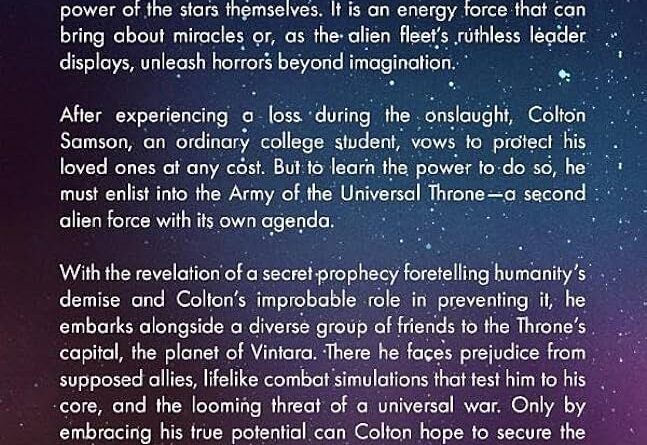
National Science Fiction Day is an annual event celebrated on January 2nd to honor the genre of science fiction literature and films. It is a day for enthusiasts to come together and appreciate this genre’s imaginative and speculative elements.
The day is marked by various activities such as reading science fiction novels, watching science fiction movies, and engaging in discussions about the impact and significance of science fiction in our society. Science fiction has shaped our understanding of the world and the possibilities that lie ahead, inspiring scientific advancements and stimulating our imaginations.
So, join in the celebration of National Science Fiction Day and explore the fascinating world of science fiction.
The Origin And Significance Of National Science Fiction Day
National Science Fiction Day is a celebration of the captivating genre that has captured the imaginations of readers and viewers for decades. Observed on January 2nd each year, this day pays homage to the literary and cinematic wonders that transport us to distant galaxies, alternate realities, and futuristic worlds.
1. Celebrating The Genre That Knows No Limits
Science fiction is a genre that knows no boundaries. From mind-bending time travel adventures to extraterrestrial encounters, the realm of science fiction allows writers and filmmakers to unleash their creativity without the constraints of reality. This genre dares to explore what lies beyond the limits of human existence, pushing the boundaries of our imagination to new heights.
2. Imagination Meets Innovation
In science fiction, imagination meets innovation, giving rise to groundbreaking ideas that often inspire real-world advancements. From Jules Verne’s visionary concepts to H.G. Wells’ predictions of technology yet to come, science fiction has long been a catalyst for scientific and technological progress. By envisioning possibilities surpassing our current reality’s limitations, science fiction sparks creativity and encourages us to think beyond the constraints of the present.
Consider the impact of iconic sci-fi creations such as Arthur C. Clarke’s concept of geostationary satellites, which laid the foundation for modern communication systems, or the legendary Star Trek series, which inspired generations of scientists and engineers to pursue careers in space exploration and technology.
3. Inspiring Critical Thinking And Social Commentary
Science fiction entertains and offers a platform for social commentary and exploration of complex moral and ethical dilemmas. This genre challenges us through imaginative storytelling to contemplate the potential consequences of scientific progress and societal changes.
Authors and filmmakers often use science fiction to examine pressing issues such as the implications of artificial intelligence, the ethical dimensions of genetic engineering, or the consequences of a dystopian society. By exploring these themes, science fiction becomes a powerful medium for encouraging critical thinking and promoting discussions on the future of humanity.
Furthermore, science fiction frequently serves as a reflection of the society in which it was created, offering insights into the hopes, fears, and aspirations of that time. Whether through the lens of utopia or dystopia, science fiction provides a mirror to examine our world and contemplate the paths we choose to follow.
On National Science Fiction Day, we celebrate this thought-provoking genre and all that it represents. So, grab a book, tune in to a sci-fi movie, or engage in a lively discussion about the possibilities beyond our current reality.
Exploring The Roots Of Science Fiction
Explore the origins of science fiction on National Science Fiction Day, delving into the intriguing world of imaginative storytelling and futuristic concepts. Discover how this genre has shaped our understanding of technology and society.
The Impact Of Early Science Fiction On Popular Culture
The early works of Verne and Wells captured readers’ imaginations and influenced popular culture in various ways. Their visions of advanced technology, space exploration, and time travel permeated through literature, film, and even scientific discoveries.
Inspired by the genre’s pioneers, science fiction literature continues to captivate readers worldwide. From the iconic “Star Wars” franchise to contemporary novels like “Dune” and “Ready Player One,” science fiction has become an integral part of our cultural landscape, reflecting humanity’s fascination with the unknown and our relentless pursuit of progress.
Moreover, science fiction has had a substantial impact on the entertainment industry. From classic films like “Blade Runner” and “Jurassic Park” to modern blockbusters like the Marvel Cinematic Universe, science fiction has consistently pushed the boundaries of visual effects, storytelling, and world-building.
Furthermore, the influence of science fiction stretches beyond literature and film. Technological advancements in various fields have been directly inspired by the speculative ideas presented in these works. From developing submarines and spaceships to exploring virtual reality, science fiction fuels innovation and serves as a blueprint for future possibilities.
In conclusion, the roots of science fiction can be traced back to the visionary works of Jules Verne and H.G. Wells. Their pioneering stories inspire and captivate audiences, shaping popular culture and sparking technological advancements. As we celebrate National Science Fiction Day, let us explore this genre’s rich history and embrace its limitless possibilities.
The Power Of Imagination In Science Fiction
Pushing Boundaries: How Science Fiction Inspires Innovation
One of the remarkable aspects of science fiction is its innate ability to push the boundaries of imagination. By diving headfirst into uncharted territories, sci-fi authors have consistently challenged conventional thinking and inspired innovation in various fields. Through their visionary ideas and narratives, they have given birth to technologies we never thought possible. From interstellar travel to artificial intelligence, science fiction has often served as a precursor to real-world advancements. So, how exactly does science fiction inspire innovation?
Examining The Visionary Ideas That Became Reality
Science fiction has a fascinating track record of envisioning ideas that ultimately became reality. This genre has consistently given us a glimpse of what could be possible, igniting our curiosity and encouraging us to pursue seemingly impossible dreams. By exploring concepts like time travel, virtual reality, and robotics, science fiction authors have entertained us and influenced the scientific community.
Let’s take a look at a few examples:
The concept of space exploration
- The Moon landing: Long before Neil Armstrong set foot on the moon, science fiction writers had been crafting tales of space exploration. Authors like Jules Verne and H.G. Wells imagined what it would be like to venture beyond Earth’s atmosphere, inspiring generations to reach for the stars.
- Mars colonization: Science fiction novels like Ray Bradbury’s “The Martian Chronicles” have painted vivid pictures of human settlements on Mars. These imaginative tales have fueled the quest for Mars colonization and the search for life beyond our planet.
The rise of artificial intelligence (AI)
- Asimov’s Three Laws of Robotics: Isaac Asimov’s science fiction stories introduced the concept of robots governed by strict ethical guidelines. Today, we see the development of AI technology aligning with the ethical considerations outlined in his works.
- Siri and Alexa: Virtual personal assistants like Siri and Alexa, popularized by science fiction, have become an everyday reality. As science fiction authors predicted, voice recognition software has become integral to our lives.
These examples demonstrate how science fiction has set the stage for technological advancements by surveying the uncharted territories of imagination. The power of science fiction lies in its ability to inspire innovators across diverse fields, encouraging them to view current limitations as opportunities for exploration and discovery.

Credit: www.hachettebookgroup.com
Science Fiction As A Tool For Social Commentary
Science fiction is a powerful vehicle for social commentary, offering imaginative and thought-provoking insights into society’s values and challenges. On National Science Fiction Day, we celebrate how this genre sparks discussions and encourages us to ponder the future of our world.
Mirror To Society: Addressing Important Issues Through Science Fiction
Science fiction has long been recognized as a powerful medium for exploring social issues and commenting on the human condition. By crafting imaginative and futuristic worlds, science fiction authors can delve into topics that might be considered controversial or sensitive in a more direct manner. This storytelling subgenre allows writers to take on political, cultural, and societal problems head-on while presenting their ideas in a thought-provoking and entertaining package.
Dystopian Vs. Utopian Visions: Lessons For The Present And Future
In the vast realm of science fiction, authors often present two starkly contrasting visions of the future: dystopian and utopian. These visions hold up a mirror to the present, highlighting the potential consequences of our actions and the paths we are currently treading.
We are reminded of the dangers of unchecked technology, oppressive governments, and environmental degradation through dystopian narratives. On the other hand, utopian visions offer glimpses of what society could be, providing inspiration and guiding our efforts to create a better world.
Within these dystopian and utopian frameworks, science fiction can teach us valuable lessons that apply to our lives today. Through the lens of fictional worlds, we are compelled to reflect on our societies and consider the potential outcomes of our choices. By exploring different scenarios, science fiction prompts us to examine our values, biases, and attitudes, encouraging critical thinking and fostering empathy.
Moreover, science fiction authors often incorporate social commentary into their stories by reimagining historical events or present-day issues. Reframing these events in a futuristic context allows readers to view them from a fresh perspective. This can lead to a deeper understanding of the complexities of the human experience and spark conversations about real-world challenges.
In conclusion, science fiction serves as a powerful tool for social commentary. It enables authors to address essential issues head-on, offering insights into the human condition and providing readers with a fresh perspective on the world around them. By exploring dystopian and utopian visions, science fiction provides valuable lessons for the present and future, prompting readers to reflect, engage, and strive for positive change.
The Effects Of Science Fiction On Pop Culture
Science fiction has profoundly impacted pop culture, shaping how we think, imagine, and consume entertainment. This genre has captivated audiences with its imaginative stories, futuristic technologies, and thought-provoking concepts.
From books to movies, science fiction has infiltrated every aspect of our lives, leaving a lasting imprint on our society. Let’s explore how science fiction has influenced popular culture, exploring its impact on entertainment and the enduring popularity of science fiction franchises.
From Books To Movies: Science Fiction’s Influence On Entertainment
Science fiction has been instrumental in revolutionizing the entertainment industry. It seamlessly combines elements of fantasy and scientific principles, creating immersive worlds that captivate audiences. The influence of science fiction can be seen in various forms of entertainment, particularly books and movies.
Books are the birthplace of science fiction, with renowned authors like Jules Verne and H.G. Wells paving the way for this genre. Their visionary works, such as “Twenty Thousand Leagues Under the Sea” and “The War of the Worlds,” introduced readers to fantastical ideas, futuristic technologies, and interplanetary adventures.
On the other hand, movies have brought science fiction to life on the silver screen, captivating audiences with visually stunning and intellectually stimulating narratives. Iconic films like “2001: A Space Odyssey,” “Blade Runner,” and “Star Wars” have not only entertained but also sparked cultural conversations and inspired generations of fans.
Science fiction movies have pushed the boundaries of visual effects, introducing cutting-edge technologies that were deemed impossible before. Concepts like time travel, artificial intelligence, and extraterrestrial life have become a staple in cinema, blurring the line between fiction and reality.
The Enduring Popularity Of Science Fiction Franchises
Science fiction franchises have embedded deep into popular culture, garnering immense followings and establishing fan communities across generations. These franchises continue to thrive, leaving an indelible mark on society.
One prime example is the “Star Trek” franchise, which originated as a television series in the 1960s and has since expanded into multiple television series, movies, books, and merchandise. Its exploration of space, futuristic technologies, and themes of equality and diversity have inspired countless individuals and shaped how we envision the future.
| Science Fiction Franchise | Mainstream Success | Noteworthy Installments |
|---|---|---|
| Star Wars | One of the highest-grossing franchises | “A New Hope,” “The Empire Strikes Back,” “The Force Awakens” |
| The Matrix | Redefining action and visual effects | “The Matrix,” “The Matrix Reloaded,” “The Matrix Revolutions” |
| Doctor Who | Longest-running science fiction television series | “Blink,” “The Day of the Doctor,” “Heaven Sent” |
These franchises have built vast mythologies, engaging audiences through their intricate storytelling and universal themes. They have become part of our cultural fabric, sparking fervent debates, cosplay, and dedicated fan conventions worldwide.
In conclusion, science fiction has left an indelible mark on pop culture, transforming how we consume entertainment and influencing our perception of the future. From its influence on books to the enduring popularity of science fiction franchises, this genre has shaped our imagination, challenged societal norms, and captivated audiences across the globe.
National Science Fiction Day Dates
| Year | Date | Day |
|---|---|---|
| 2024 | January 2 | Tuesday |
| 2025 | January 2 | Thursday |
| 2026 | January 2 | Friday |
| 2027 | January 2 | Saturday |
| 2028 | January 2 | Sunday |
Frequently Asked Questions For National Science Fiction Day
Why National Science Fiction Day Is Celebrated?
National Science Fiction Day honors the genre and its impact on popular culture. It aims to recognize the creativity and imagination of science fiction writers and their contributions to society.
What Day Is National Science Fiction Day?
National Science Fiction Day is celebrated on January 2nd every year.
How Do You Celebrate Science Fiction Day?
Celebrate Science Fiction Day by reading sci-fi books, watching movies, or attending sci-fi conventions.
What National Day is January 2, 2023?
January 2, 2023, is recognized as National Personal Trainer Day, celebrating the dedication and expertise of fitness professionals.
Conclusion
To sum it up, National Science Fiction Day celebrates the boundless imagination and creative genius displayed in this genre. Science fiction has shaped our perception of the future, from robots to space exploration. Engaging with this storytelling medium not only entertains us but also stimulates our curiosity and fuels scientific advancements.
So, on this day, let’s embrace the futuristic visions of science fiction and appreciate its profound impact on our world.





